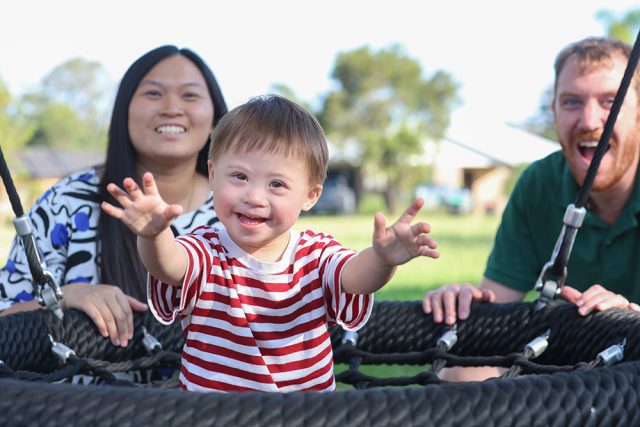When Claremont Meadows mum Julie Louden found out her baby girl had Down syndrome, she said she couldn’t understand what all the fuss was about – until a specialist gave her a reason to.
“He said, ‘Oh well, your child’s got Down syndrome’, and that was it, and I said, ‘What does that mean? She’s pretty healthy, that means she’ll lead a fairly normal life?’, and he goes, ‘Oh no, she’ll never be normal’,” she said.
It was this interaction that instilled her with fear, followed by people around her continually offering apologies and concerns before congratulations.
“It was pretty traumatic, realistically, now looking back,” she said.
“We didn’t tell anyone until she was about six-weeks-old. We had to process it ourselves before we felt comfortable telling anyone, but she had to have heart surgery at six-weeks-old, so we had to tell everyone why.
“There was no congratulations involved, it was just all about how sorry we are that you didn’t get a healthy baby, when we did actually get a healthy baby.”
Julie’s daughter Bridie Louden is now 18, but it seems that nothing has changed, with parents of now two-year-old Henry Fisher experiencing the same “stressful and traumatic” interactions at their 12-week scan all these years later.
“Upon reflection, it’s quite focused on the negatives of what Down syndrome is,” mum Jenny Lai said.
“We got told that our baby would have all these complications, and we’d been trying to fall pregnant for ages, and to have that presented to you, it shattered us.”
Almost immediately, both families recall connecting to Down Syndrome NSW – an organisation which aims to provide assistance for people with Down syndrome and their families – a game changer for all in terms of sourcing information and support systems.
According to Julie, thanks to the help she’s received, Bridie is truly thriving, currently completing Year 12 at Nepean CAPA High School in the support unit, and working her dream job at Officeworks.
“The school have been great, and they’ve helped me out with Officeworks at Penrith,” she said.
“The store manager there is amazing, and he’s taken her on once a week for a couple of hours.”
Henry is also doing incredibly well, with some of his favourite things including making friends, the Sydney Swans, and grocery shopping at Cranebrook Woolworths. He is also multilingual, and is able to understand and communicate in Chinese Teochew, English and Auslan.
“He’s not what was painted to us at that 12-week scan. He’s done really well,” she said.
“He loves singing and dancing, kicking around the ball, and he’s really obsessed with buses at the moment. He’s defied a lot of expectations of what Down syndrome is.”

Henry’s father Kieran Fisher said that a lot of the reasons he’s been able to beat these expectations is that the two of them have never limited him, aligning with this year’s World Down Syndrome Day theme, ‘End the Stereotypes’, celebrated on Thursday, March 21.
“As teachers, we’re consistently told to have high expectations of our students, and it’s the same for people with disabilities,” he said.
“If we limit them by setting limits on what their potentials are, we’re already putting them at a disadvantage.”
Reflecting on the time between Henry’s diagnosis and now has only driven them more to create change on a broader scale.
“[Initially], we didn’t get a balanced opinion, and that’s something that’s very important and that we are really pushing for,” Fisher said.
“Yes, it’s important to know the facts behind some of these health conditions, but we have NDIS, we have so many different support services available, and most health professionals have been really fantastic with him, so having that more balanced view I think would have alleviated a lot of the stress.”
Julie is also hoping to shine a light on how incredible people with Down syndrome can be.
“There’s a lot of struggles, don’t get me wrong, but overall, they’re a lot like any typical child. They have their moments, and they have their good times, and they have their moods like any teenager does, but apart from that, they’re just delightful,” she said.
“Would I change anything? Of course I would. I would change her struggles, I would try to take away all of that, but, I wouldn’t change who she is.”

Cassidy Pearce
Cassidy Pearce is a news and entertainment journalist with The Western Weekender. A graduate of the University of Technology Sydney, she has previously worked with Good Morning Macarthur and joined the Weekender in 2022.

